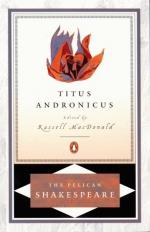|
This section contains 6,657 words (approx. 23 pages at 300 words per page) |

|
SOURCE: Huffman, Clifford Chalmers. “Titus Andronicus: Metamorphosis and Renewal.” Modern Language Review 67, no. 4 (October 1972): 730-41.
In the following essay, Huffman compares Titus Andronicus with Ovid's Metamorphoses, emphasizing the theme of destruction and renewal in both works.
With a reservation indicated by inverted commas, Geoffrey Bullough terms Titus Andronicus (printed 1594) ‘classical’.1 Other scholars have stressed the importance for this early Shakespearian play2 of details associated with Seneca and Plutarch,3 and a most significant and influential study, by Eugene Waith, concentrates on Ovid's Metamorphosis.4
Ovid's deliberate and elaborate rhetorical variations of description and narration, which seem to some readers dispassionate and cold-blooded, subordinate the potential tragedy of character to an overriding concern with metamorphosis itself—with change and continuity. Ultimately, Waith argues, the poem sees all created life as part of ‘vital force’, of Lucretian nature;5 the theme is ‘the opposition of moral and political disorder to the unifying force...
|
This section contains 6,657 words (approx. 23 pages at 300 words per page) |

|


